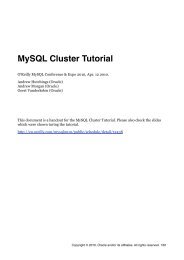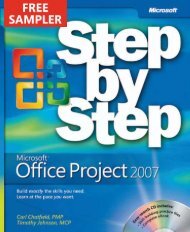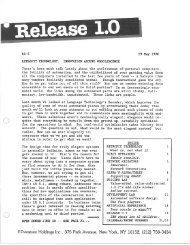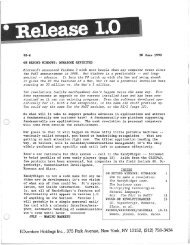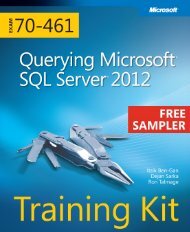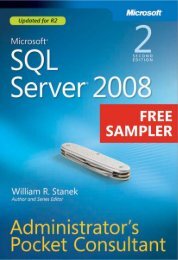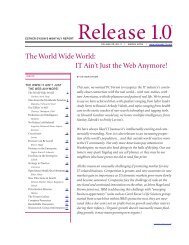Learning Python, 5th Edition - cdn.oreilly.com
Learning Python, 5th Edition - cdn.oreilly.com
Learning Python, 5th Edition - cdn.oreilly.com
Create successful ePaper yourself
Turn your PDF publications into a flip-book with our unique Google optimized e-Paper software.
in consistent and limited ways and follow naturally from a small set of core concepts.<br />
This makes the language easier to learn, understand, and remember. In practice, <strong>Python</strong><br />
programmers do not need to constantly refer to manuals when reading or writing code;<br />
it’s a consistently designed system that many find yields surprisingly uniform code.<br />
By philosophy, <strong>Python</strong> adopts a somewhat minimalist approach. This means that although<br />
there are usually multiple ways to ac<strong>com</strong>plish a coding task, there is usually<br />
just one obvious way, a few less obvious alternatives, and a small set of coherent interactions<br />
everywhere in the language. Moreover, <strong>Python</strong> doesn’t make arbitrary decisions<br />
for you; when interactions are ambiguous, explicit intervention is preferred over<br />
“magic.” In the <strong>Python</strong> way of thinking, explicit is better than implicit, and simple is<br />
better than <strong>com</strong>plex. 1<br />
Beyond such design themes, <strong>Python</strong> includes tools such as modules and OOP that<br />
naturally promote code reusability. And because <strong>Python</strong> is focused on quality, so too,<br />
naturally, are <strong>Python</strong> programmers.<br />
Developer Productivity<br />
During the great Internet boom of the mid-to-late 1990s, it was difficult to find enough<br />
programmers to implement software projects; developers were asked to implement<br />
systems as fast as the Internet evolved. In later eras of layoffs and economic recession,<br />
the picture shifted. Programming staffs were often asked to ac<strong>com</strong>plish the same tasks<br />
with even fewer people.<br />
In both of these scenarios, <strong>Python</strong> has shined as a tool that allows programmers to get<br />
more done with less effort. It is deliberately optimized for speed of development—its<br />
simple syntax, dynamic typing, lack of <strong>com</strong>pile steps, and built-in toolset allow programmers<br />
to develop programs in a fraction of the time needed when using some other<br />
tools. The net effect is that <strong>Python</strong> typically boosts developer productivity many times<br />
beyond the levels supported by traditional languages. That’s good news in both boom<br />
and bust times, and everywhere the software industry goes in between.<br />
Is <strong>Python</strong> a “Scripting Language”?<br />
<strong>Python</strong> is a general-purpose programming language that is often applied in scripting<br />
roles. It is <strong>com</strong>monly defined as an object-oriented scripting language—a definition that<br />
blends support for OOP with an overall orientation toward scripting roles. If pressed<br />
for a one-liner, I’d say that <strong>Python</strong> is probably better known as a general-purpose pro-<br />
1. For a more <strong>com</strong>plete look at the <strong>Python</strong> philosophy, type the <strong>com</strong>mand import this at any <strong>Python</strong><br />
interactive prompt (you’ll see how in Chapter 3). This invokes an “Easter egg” hidden in <strong>Python</strong>—a<br />
collection of design principles underlying <strong>Python</strong> that permeate both the language and its user<br />
<strong>com</strong>munity. Among them, the acronym EIBTI is now fashionable jargon for the “explicit is better than<br />
implicit” rule. These principles are not religion, but are close enough to qualify as a <strong>Python</strong> motto and<br />
creed, which we’ll be quoting from often in this book.<br />
Is <strong>Python</strong> a “Scripting Language”? | 5



